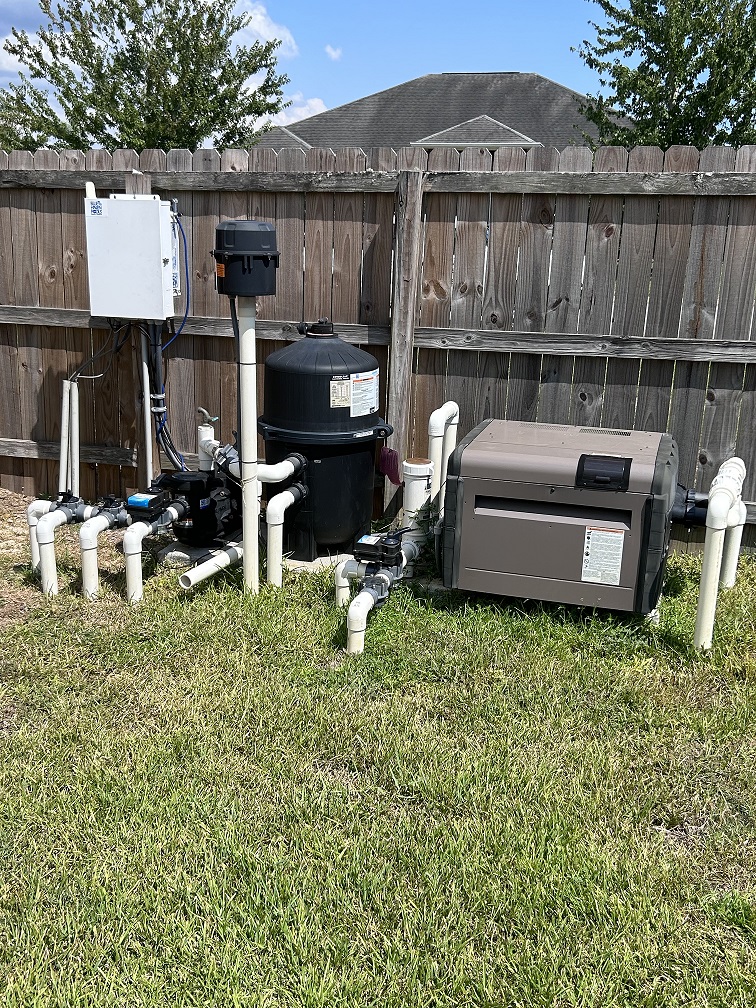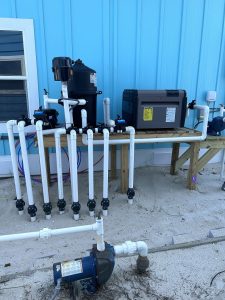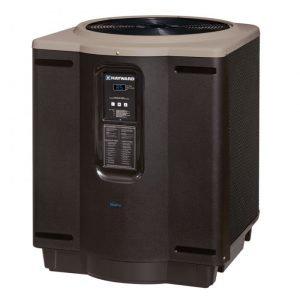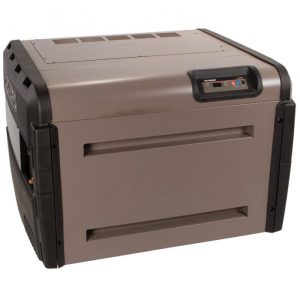A pool heater is add-on equipment that keeps your pool at a consistent, warm temperature. It is ideal for extending the swimming season to any time of year, not just when the weather agrees with you. Pool heaters come in many sizes and types, each with unique benefits and potential drawbacks that every pool owner should know.
If you’re considering purchasing a pool heater for your in-ground swimming pool, there are probably a lot of questions already doing laps in your head. With so much jargon and information to soak up, what are the need-to-know details about buying pool heaters?
Here’s a guide containing only the most essential information to help you compare heaters and purchase the right one for your pool.
If you are looking for a new pool heater, contact Calm Waters today about our pool heaters.
There are many benefits to having a warm pool at any time. Most obviously, you can swim whenever you want — any time of day or season. If you love the luxury of having a swimming pool, you’ll undoubtedly love being able to pop in for a dip on a brisk winter evening in Florida.

Many would argue that pool heaters aren’t necessary since Florida’s climate is warmer than other areas of the U.S. But truthfully, as any Floridian knows, there’s no shortage of chillier days where jumping in the pool feels off-limits. And it’s a shame to install a new pool only to feel like you can’t hop in because a random day in October decided to drop into the high 50s.
Pools are also an excellent investment for homeowners, and the more attention and care you give this investment, the better the value. Adding a pool heater will benefit you now and later should you ever choose to sell your home.
Warmer water can also help alleviate aches or stiffness that would otherwise worsen in cold water. Even slightly cooler water can affect your muscles, so keeping your swimming pool at a set temperature ensures you’re always comfortable, especially if you’re using your pool to exercise.
Finally, a heat pump is a reliable addition that adds much value to your pool beyond monetary value. It’s cost-efficient, so it’s an upgrade you can feel good about investing in.
Another important consideration when shopping for pool heaters is deciding which type is best for you. There are three main types of pool heaters. Any could work for your pool, but individual quirks could be a deal breaker for some homeowners. Here’s what each type brings to the table and why they might be a good fit for your pool.

Gas heaters are perfect for homeowners who need to heat their pools rapidly. They’re also capable of maintaining any temperature, no matter the weather. These pool heaters are ideal if you’re not using your swimming pool very often but don’t want to wait forever for it to heat up when you do.
Hayward, Jandy, and Raypak heaters are popular, trustworthy models, so it’s wise to compare pool heaters to other gas-powered options when you shop around.
You’ll need to consider your elevation when you buy a gas heater. If you’re in a higher altitude area, some gas pool heaters won’t operate. You’ll also want to consider which type of gas your pool heater will use — natural gas or propane.
Homeowners will need a separate tank for propane-powered water heaters, while with natural gas, it’s simpler to run a line from the source to your swimming pool heater. Propane is typically more expensive than natural gas.

While the current price of heat pump pool heaters is usually higher than gas heaters, their lower operating costs offset this uptick in price. With the right maintenance, these swimming pool heaters are more efficient and often last longer than gas heaters. Heat pumps are often best for milder climates but work well in warm climates under the right conditions.
Heat pumps do, however, draw heat from the air to heat your pool water. This makes them less efficient if the temperature drops too low; fortunately, this is a relatively rare issue in Florida, but still something to consider.
Some heat pump models can also cool your pool water. This benefit is important for Florida pool owners, as it makes summer swimming more comfortable on hotter days when it feels like the sun is boiling the pool water.

Like heat pumps, electric pool heaters usually cost more than natural gas pool heaters. But they’re also well worth it for similar reasons — they’re more efficient and last longer than gas heaters. Heat pumps are generally cheaper to run over the course of a year since they use the air to work.
Electric heaters are an excellent mixture of the other two. They can provide quick heat, making hopping in your in-ground pool on a whim easy. They aren’t as good at maintaining the heat, unfortunately. And they also share the same issue of losing their efficacy when temperatures drop below 50.
Pools come in various sizes, so it only makes sense that you’d need the right size pool heater to warm your pool adequately. But how warm you’d like your pool to be can also determine the best size. Here’s how to sift through your options and pick a size to fit your needs.
When you shop for pool heaters, you’ll see that they’re measured in a precise way — by BTU. This is the British thermal unit, or the amount of energy required to increase the temperature of one pound of water by one degree Fahrenheit. The higher BTUs a pool heater has, the more efficient it will be at heating larger pools.
Which one is accurate for you? Start by following these simple steps to get the basic calculations about your pool’s size.
Pools with larger surface areas will have a harder time retaining heat. To calculate your pool’s surface area, multiply its length by its width.
You might already know how deep your pool water is if you planned it out with whoever installed it. But if you aren’t sure, you can take the shallowest and deepest end, add the numbers together, and divide the number by two.
Take the number you came up with from the surface area calculation and multiply it by the average depth of your pool water. This new number is the average cubic feet of your swimming pool. Multiply this number by the very specific 7.48 to get an estimate in gallons.
If you think of 80 degrees as the target pool temperature and the weather outside is 70 degrees, you can multiply the number of gallons in your pool by four. Note that the colder the outside air, the more BTUs are required to hit higher temperatures.
It seems like a lot of extra math, but getting this number can save you a lot of headaches during your search and prevent you from buying a pool heater model that doesn’t work with your pool’s size.
Unfortunately, a bit more nuance can complicate things, but let’s break it down. Since gas heaters and heat pumps are different technologies, you’ll probably need a higher BTU gas heater to do the same job a smaller BTU pool heater that uses electricity can achieve.
If you want to buy a natural gas or propane pool heater, you’ll almost always want to size up to compensate for inconsistencies. You may want to consider going above the recommended BTU regardless, as the number you get will be the rough minimum size, meaning it’s not necessarily the most efficient.
If you’ve calculated your BTU and know which type of pool heater you plan to buy, you can discuss this with the company you want to purchase it from. Pool experts can use the number to determine which pool heater works best. Know that heat pump BTUs will almost always be lower because they can use the heat in the air to help heat the pool.
Your heater’s efficiency will be affected by a lot of other circumstances. Everything from how often you use your pool to potential amounts of evaporation could cause some heaters to be more or less effective.
You can’t necessarily account for everything, but if you’re in a warmer climate like Alabama or Florida and plan to use your pool heater often, you should expect to purchase something with a higher BTU than someone with the same size pool would in a different climate.
There’s a lot of information to cover when talking about pool heaters. To make things simpler, here are the common questions experts get asked by curious pool owners about buying a new pool heater.
How pool heaters work varies between gas, electric, and heat pump systems. Gas and electric heaters will generate energy to heat a coil that warms up your pool’s water. The water cycles between the pool and the pool heater, ensuring it always stays at the right temperature.
Heat pumps are different — they use a fan that extracts the warm air from the outside and passes it over an evaporator coil. The refrigerant mixes with the warm air to create a gas, which travels to a compressor. Once the system deems everything hot enough, the water pumps back into the pool at the perfect temperature.
If you own a gas pool heater, you should expect your water to hit the target temperature within roughly 6 to 24 hours, the higher end being more likely if you have a larger pool.
Electric heaters will get your pool water to temperature anywhere from 12 to 48 hours. Heat pumps fall into last place, usually warming your pool sufficiently at the 24- to 72-hour mark. The smaller your pool, the faster these heater products will reach the right temperature.
For example, it could be worth investing in gas pool heaters if you have a large pool and want it to heat quickly. However, smaller pools could reap many benefits from heat pumps. View any potential options and compare the information with your pool’s stats to get a pool heater that warms the water as quickly as you’d like.
The answer to this question depends on how much you intend to use your pool. You can lower the temperature or even turn it off if you know you won’t use the pool for a few days. Doing so could potentially save you a lot on energy costs. Just know you’ll have to plan around the heater, taking some time to return to a comfortable temperature.
It’s also often advised to leave your pool heater on year-round to keep your pipes from freezing over. But because that’s rarely an issue in Florida, you don’t necessarily need to follow this rule all the time.
However, if you notice a cold snap in the forecast, it’s wise to turn the pool heater on to ensure that the water is comfortable and that the cold doesn’t cause wear and tear on your system.
Most pool heaters have an average lifespan of 10 to 12 years. Much like the answer to every question in this guide, the number will vary depending on what model and type of pool heater you buy. Gas pool heaters usually don’t last as long as the other two types, while heat pumps can last up to 20 years.
You can extend your pool heater’s lifespan by scheduling consistent maintenance. However, other variables will also impact how long it lasts, like how much you use your heater and the quality of the products. Learn as much as possible about the company you buy your heater from to ensure you get something reliable.
Swimming pool water heaters should be installed by a professional with the proper training. A sound installation is crucial if you want your system to work optimally. Work only with companies that have a background in pool heater installation.
It’s also an excellent time to save some money if possible; check to see if the company offers benefits like free delivery or warranties to ensure you’re getting the most from your purchase.
If your pool heater stops working, you can start with light troubleshooting. First, consider the temperature: is it a particularly cold day? The temperature will impact how certain heaters perform, and some could even not run. You should also check the filter and safety switches, as an unclean filter or a flipped switch could be the culprit.
There are many other ways to determine whether your heater is broken, but the best way to know is to call for professional assistance. Regular maintenance will help prevent damage, but it can also diagnose problems so they can be fixed quickly.
If you suspect your pool heater is damaged, immediately call a pool maintenance expert for a repair.
It would help if you aimed to get your pool heater serviced at least once a year, with a light check-up during your maintenance visit every season. Florida homeowners will likely use their pools more than the average person, so it might be a good idea to call twice a year to ensure your heater works optimally.
Annual maintenance will ensure your heater works for roughly as long as intended. But bi-annual maintenance could extend its longevity further and better prevent potential parts from breaking. Whichever maintenance schedule you choose will come down to personal preference, but you don’t want to wait until it’s too late to call for services.
Purchasing a pool heater is only half the equation — you must also connect with a professional company that can care for and maintain it.
Calm Waters Pool Services® has pool maintenance experts who know about every type of pool heater, so we have what it takes to keep yours working efficiently for years. Contact our team today to learn more about our pool heater servicing!